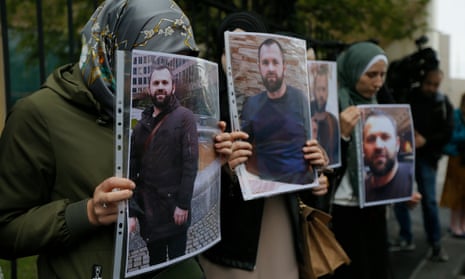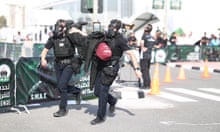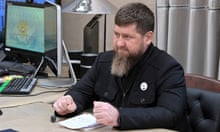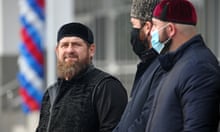Germany has expelled two Russian diplomats after state prosecutors announced they had “sufficient evidence” that Moscow or the Chechen government sanctioned the assassination of a a Chechen separatist in Berlin.
The federal prosecutor in Karlsruhe, which deals with crimes against the state, on Wednesday declared the shooting of Zelimkhan Khangoshvili in broad daylight in August a deed of “highest relevance to state security” and said it would take over investigations.
The German foreign office on Wednesday morning informed the Russian ambassador to Berlin, Sergei Netschajew, that two of his employees were considered personae non gratae with immediate effect, citing the Kremlin’s refusal to cooperate in investigations into Khangoshvili’s murder.
Russia’s foreign ministry described the expulsions as “unfriendly and unfounded”, and promised it would respond in due course. Kremlin spokesperson Dmitry Peskov on Wednesday denied any Russian involvement: “This is absolutely groundless speculation”, he told Russian reporters. “This topic is being somehow whipped up by German media, but this does not mean that this is how things are”
In what has been called a “second Skripal case” after the 2018 attack on the former Russian spy in Salisbury, 40-year-old Khangoshvili was shot dead in a Berlin park just before midday on 23 August.
The killing fits a pattern of hits on Chechen separatists who fought Russian forces that have often had signs of Russian state involvement. Russian intelligence had classified Khangoshvili, an ethnic Chechen from Georgia’s Pankisi Gorge, as a member of the terrorist organisation “Caucasian Emirates”, the German federal prosecutor said on Wednesday.
The suspected assassin was arrested by police after disposing of a handgun and his mountain bike into a canal, and before trying to escape from the crime scene on an electric scooter, apparently wearing a wig to disguise himself as a tourist.
He is currently being held in a Berlin prison cell but has so far refused to cooperate during questioning. The Russian passport with which the hitman had travelled to Germany names him as Vadim Sokolov, but experts have questioned the authenticity of the document.
The federal prosecutor said on Wednesday he decided to take on the case after forensics experts identified the assassin as the same person, Vadim Krasikov, who was sought over the murder of a Russian businessman in Moscow in June 2013.
As in the Berlin case, the murderer of restaurant entrepreneur Albert Nazranov had approached his target on a bicycle before firing lethal shots from a Makarov pistol. The incident was filmed by security cameras and broadcast by several Russian TV channels.
Investigative outfit Bellingcat, which has also independently matched the Vadim Sokolov alias to Vadim Krasikov, reported on Tuesday that Russia had issued an international search warrant for the then 49-year-old in 2014 only to silently withdraw it only a year later, as well as purging his records from state databases.
Another detail that had raised the suspicions of German investigators was Krasikov had flown from Moscow to Paris’ Charles de Gaulles airport on a work visa which stated that he worked as a structural engineer for the St Petersburg-based company ZAO RUST.
Research by German prosecutors, however, found that the same company only had a single employee and that a fax number linked the business to the Russian defence ministry.
The German federal prosecutor said there were no signs the killing had been commissioned by a non-state actor and that investigations had not found a personal motive or links to terrorism or organised crime.
Patrick Sensburg, an MP from Angela Merkel’s CDU party, told the Guardian that Germany would take further diplomatic steps to put pressure on Russia to cooperate with investigations.
“For now, we need to further investigate the motives behind the murder. But if Russia continues to stonewall our efforts, then we need to consider further sanctions, such as expelling even more senior diplomats or putting talks about joint economic projects on hold. If Russia merely retaliates, we could easily end up in a situation we haven’t seen since the Cold War”.










